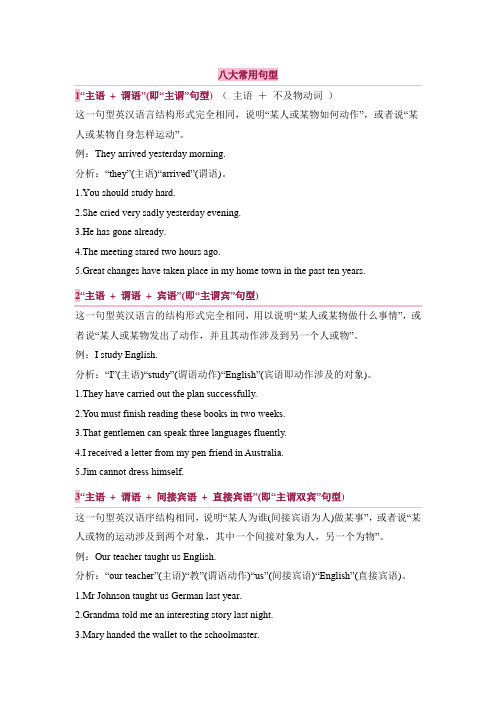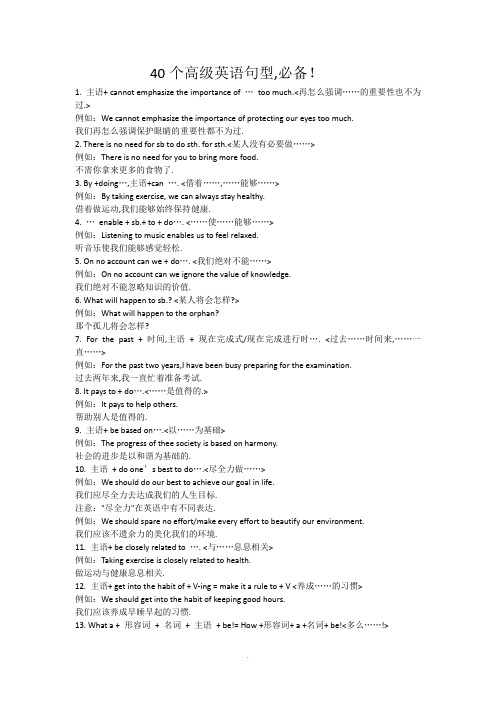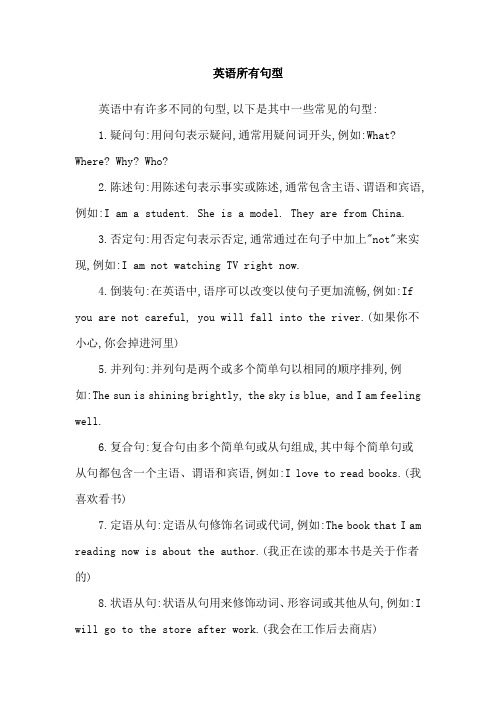句型
句型有哪几种类型

句型有哪几种类型
答:有12种类型。
1.陈述句:
陈述句是用来说明事实的句子。
例:今天好冷呀。
2.感叹句:
感叹句就是带有强烈感情的句子,句末用感叹号。
例:我太开心了!
3.疑问句:
疑问句是用来表达自己疑问的句子。
例:今天下雨了吗?
4.反问句:
反问句就是用疑问的句式,表达肯定的观点。
例:难道今天不冷吗?
5.设问句:
设问句就是明知故问,自问自答。
例:数学难吗?其实不难。
6.肯定句:
对事物做出肯定判断的句子叫肯定句。
例:你真是一个聪明的孩子。
7.否定句:
表示否定的句子,必须含有否定词。
例:这不是我的钢笔。
8.双重否定句:
双重否定句就是否定两次,表示肯定的句子。
例:我不得不承认那个是我的东西。
9.拟人句:
拟人句就是把本来不具备人的一些动作和感情的事物变成和人一样有感情、有语言、有动作的句子。
例:小狗伸了个懒腰。
10.比喻句:
比喻句就是有本体、喻体、比喻词的句子。
例:寒风吹在脸上好像刀割一样。
11.把字句:
把字句就是“主语+‘把’+宾语+动作”这样结构的句子。
例:弟弟把水喝了。
12.被字句:
例:他被激怒了。
英语八大常用句型

八大常用句型1“主语+ 谓语”(即“主谓”句型) (主语+不及物动词)这一句型英汉语言结构形式完全相同,说明“某人或某物如何动作”,或者说“某人或某物自身怎样运动”。
例:They arrived yesterday morning.分析:“they”(主语)“arrived”(谓语)。
1.You should study hard.2.She cried very sadly yesterday evening.3.He has gone already.4.The meeting stared two hours ago.5.Great changes have taken place in my home town in the past ten years.2“主语+ 谓语+ 宾语”(即“主谓宾”句型)这一句型英汉语言的结构形式完全相同,用以说明“某人或某物做什么事情”,或者说“某人或某物发出了动作,并且其动作涉及到另一个人或物”。
例:I study English.分析:“I”(主语)“study”(谓语动作)“English”(宾语即动作涉及的对象)。
1.They have carried out the plan successfully.2.You must finish reading these books in two weeks.3.That gentlemen can speak three languages fluently.4.I received a letter from my pen friend in Australia.5.Jim cannot dress himself.3“主语+ 谓语+ 间接宾语+ 直接宾语”(即“主谓双宾”句型)这一句型英汉语序结构相同,说明“某人为谁(间接宾语为人)做某事”,或者说“某人或物的运动涉及到两个对象,其中一个间接对象为人,另一个为物”。
英语八大句型例句

英语八大句型例句
1. 主+谓:I run every morning.(我每天早上跑步呀。
)
2. 主+谓+宾:You like reading books.(你不是喜欢读书嘛。
)
3. 主+谓+间宾+直宾:He gave me a hug.(他给了我一个大大的拥抱呢。
)
4. 主+谓+宾+宾补:They made the room clean.(他们把房间弄得干干净净的呀。
)
5. 主+系+表:She is very happy.(她可开心啦。
)
6. There be 句型:There are many flowers in the garden.(花园里有好多花儿呀。
)
7. 祈使句:Come here!(快过来呀!)
8. 感叹句:How beautiful the scenery is!(这景色真美啊!)
9. 疑问句:Do you know him?(你认识他不?)
10. 强调句:It is you who made the mistake.(就是你犯的错呀。
)
我的观点结论就是:这些例句是不是很简单易懂呀,大家可以多练习,英语八大句型就能轻松掌握啦!。
100个英语模板句型

100个英语模板句型1. want to do sth 想做某事2. want …… to do sth 想让某人做某事3. be different from 与……不同4. be the same as 与……相同5. be friendly to ……对某人友好6. welcome to ……欢迎来到某地7. What’s the matter with ……/sth?某人/某物出什么毛病了?8. what to do 做什么9. let …… do sth 让某人做某事10. let …… not do sth 让某人不做某事11. why don’t you do sth?你怎么不做某事呢?12. why not do sth?怎么不做某事呢?13. make …… sth 为某人制造某物14. make sth for ……为某人制造某物15. What do you mean by doing sth?你做……是什么意思?16. like doing sth 喜爱做某事17. like to do sth 想去做某事18. feel like doing sth 想要做某事19. would like to do sth 想要做某事20. would like …… to do sth 想要某人做某事21. make …… do sth 使某人做某事22. let …… do sth 让某人做某事23. have …… do sth 使某人做某事24. be far from ……离某地远25. be near to ……离某地近26. be good at sth/doing sth 擅长某事/做某事27. It takes …… some time to do sth 做某事花费某人多长时间28. ……ends some time/money (in )doing sth 某人花一些时间/钱做某事29. …………ends some time/money on sth 某人花一些时间/钱在某事/物上30. sth costs …… some money 某物花了某人一些钱31. …… pays some money for sth 某人为某物付了一些钱32. begin/start sth with sth 伴随……开始做某事33. be going to do sth 打算做某事34. call A B 叫A B35. thank …… for sth/doing sth 感谢某人做某事36. What……for?为什么?37. How/ what about doing sth?做某事怎么样?38. S +be+ the+最高级+of/in短语39. S + be +比较级+than any other + n40. have to do sth 不得不/必须做某事41. had better do sth 最好做某事42. had better not do sth 最好别做某事43. help …… to do sth 帮助某人做某事44. help …… do st 帮助某人做某事45. help …… with sth 帮助某人做某事46. make it +时间把时间定在……47. take …… to ……带某人到某地49. have nothing to do (with ……)与某人没有关系50. 主语+ don’t think + 从句……认为……不……51. It’s + adj + for …… to do sth 做某事对某人来说怎么样52. How + adj/adv + 主+ 谓!……多么…...啊!53. what + a/an + adj + [c] + 主+ 谓!54. What + adj+ pl/[u] +主+ 谓!55. find it + adj + to do sth 发现做某事如何56. ask …… for sth 向某人要某物57. need to do sth 需要做某事58. need sth 需要某物59. use sth to do sth 用某物来做某事60. show …… sth 给某人看某物61. show sth to ……把某物给某人看62. pass …… sth 把某物递给某人63. pass sth to ……把某物递给某人64. buy …… sth 为某人买某物65. buy sth for ……为某人买某物66. give …… sth 把某物给某人67. give sth to ……把某物给某人68. get to ……达到某地69. arrive at/in ……达到某地70. reach ……达到某地71. hope to do sth 希望某人做某事72. there is sth wrong with sth/……某物/某人出毛病了73. sth is wrong with……某物出毛病了74. How do you like sth?你认为……怎么样?75.What do you think of sth?你认为……怎么样?76. start doing sth 开始做某事77. start to do sth 开始做某事78. finish doing sth 完成做某事79. enjoy doing sth 喜欢做某事80. what else……别的什么81. forget doing sth 忘记做过某事(已做)82. forget to do sth 忘了做某事(未做)83. remember doing sth 记得做过某事(已做)84. remember to do sth 记住做某事(未做)85. stop to do sth 停下来去做另一件事86. stop doing sth 停止正在做的事87. watch/see/hear …… do sth 观看/看见/听见某人做了某事88. watch/see/hear …… doing sth 观看/看见/听见某人在做某事89. go on doing sth 继续做同一件事90. go on to do sth 继续做另一件事91. go on with sth 继续某事He went on with his work after a short rest.在短暂的休息后,他继续他的工作。
英语的句型句式大全

英语的句型句式大全一、基础句型1.Subject + Verb–Examples:•She runs.•They eat.2.Subject + Verb + Object–Examples:•I love you.•He reads books.3.Subject + Verb + Indirect Object + Direct Object–Examples:•She gave me a gift.•He bought her a car.4.Subject + Verb + Complement–Examples:•She is happy.•They are friends.二、特殊句型1.Question Form–Examples:•Where is the cat?•Did you see the movie?2.Conditional Sentences–Examples:•If it rains, we will stay inside.•She would come if she had time.3.Passive Voice–Examples:•The book was written by the author.•The cake was eaten by the children.三、复杂句式1.Relative Clauses–Examples:•The boy who is wearing a red shirt is my brother.•The book that I borrowed from the library is interesting.2.Coordinating Conjunctions–Examples:•I want both the cake and the ice cream.•He is not only smart but also kind.3.Subordinating Conjunctions–Examples:•Although it was raining, we went out.•She will come when she finishes work.四、强调句型1.It is/was + Adjective + that/who + Subject + Verb–Example:•It was Mary who won the competition.2.Subject + Verb + what/who/which + Object + Verb–Example:•I saw what you did.五、形容词和副词的句型1.Adjective + Noun–Examples:•Beautiful flowers•Fast car2.Adverb + Verb–Examples:•Quickly run•Carefully readparative and Superlative Forms–Examples:•He is taller than his brother.•She is the smartest in the class.六、感叹句型1.What + Noun + Subject + Verb!–Example:•What a beautiful day it is!2.How + Adjective/Adverb + Subject + Verb!–Example:•How quickly he runs!以上是英语中常见的句型句式,掌握这些基础句型和特殊句型可以帮助提升英语表达能力,丰富句子结构,让语言更加生动自然。
五种基本句型

五种基本句型高一英语五种基本句型1、主语+ 系动词+ 表语2、主语+ 不及物动词3、主语+ 及物动词+ 宾语4、主语+ 及物动词+ 间接宾语+ 直接宾语5、主语+ 及物动词+ 宾语+ 宾语补足语主语+ 系动词+ 表语1. Jack is a good boy.2. The park looks beautiful in spring.3. His leg got hurt just now.4. Please keep silent!5. Tom will become a doctor next year.主语+ 不及物动词1. My grandma is sleeping now.2. I will stay in Shanghai for a week.3. Jack is leaving for New York.4. It rained hard last night.5. Lucy arrived in Beijing yesterday.主语+ 及物动词+ 宾语1. My sister is writing a letter at this moment.2. Jack enjoys collecting stamps.3. Our teacher promised to see themovie with us.4. I d on’t know which school he is in.主语+ 及物动词+间接宾语+ 直接宾语1. His father bought him a computer.2. I sent a birthday gift to her yesterday.3. My mother taught me how to do it.4. She asked Lucy whose pen it was. 主语+ 及物动词+宾语+ 宾语补足语1. We must keep the classroom clean.2. They consider Jack a brave boy.3. Let the fresh air in.4. Lucy will make herself known.5. I saw the little girl dancing.简单句的五种基本句型歌诀:英语句型万万千,五大句型把线牵;句型种类为动词,后接什么是关键;系词后面接表语,Vi.独身无牵连;Vt.又可分三类,单宾双宾最常见,还有宾语补足语,各类搭配记心间。
40个高级英语句型-必备!

40个高级英语句型,必备!1. 主语+ cannot emphasize the importance of …too much.<再怎么强调……的重要性也不为过.>例如:We cannot emphasize the importance of protecting our eyes too much.我们再怎么强调保护眼睛的重要性都不为过.2. There is no need for sb to do sth. for sth.<某人没有必要做……>例如:There is no need for you to bring more food.不需你拿来更多的食物了.3. By +doing…,主语+can …. <借着……,……能够……>例如:By taking exercise, we can always stay healthy.借着做运动,我们能够始终保持健康.4. …enable + sb.+ to + do…. <……使……能够……>例如:Listening to music enables us to feel relaxed.听音乐使我们能够感觉轻松.5. On no account can we + do…. <我们绝对不能……>例如:On no account can we ignore the value of knowledge.我们绝对不能忽略知识的价值.6. What will happen to sb.? <某人将会怎样?>例如:What will happen to the orphan?那个孤儿将会怎样?7. For the past + 时间,主语+ 现在完成式/现在完成进行时…. <过去……时间来,……一直……>例如:For the past two years,I have been busy preparing for the examination.过去两年来,我一直忙着准备考试.8. It pays to + do….<……是值得的.>例如:It pays to help others.帮助别人是值得的.9. 主语+ be based on….<以……为基础>例如:The progress of thee society is based on harmony.社会的进步是以和谐为基础的.10. 主语+ do one’s best to do….<尽全力做……>例如:We should do our best to achieve our goal in life.我们应尽全力去达成我们的人生目标.注意:"尽全力"在英语中有不同表达.例如:We should spare no effort/make every effort to beautify our environment.我们应该不遗余力的美化我们的环境.11. 主语+ be closely related to …. <与……息息相关>例如:Taking exercise is closely related to health.做运动与健康息息相关.12. 主语+ get into the habit of + V-ing = make it a rule to + V <养成……的习惯>例如:We should get into the habit of keeping good hours.我们应该养成早睡早起的习惯.13. What a + 形容词+ 名词+ 主语+ be!= How +形容词+ a +名词+ be!<多么……!>例如:What an important thing it is to keep our promise!= How important a thing it is to keep our promise!遵守诺言是多么重要的事!14. 主语+ do good/ harm to sth.. <对……有益/有害>例如:Reading does good to our mind.读书对心灵有益.Overwork does harm to health.工作过度对健康有害.15. 主语+ have a great influence on sth. <对……有很大的影响>例如:Smoking has a great influence on our health.抽烟对我们的健康有很大的影响.16. nothing can prevent us from doing…. <没有事情能够阻挡我们做……>例如:All this shows that nothing can prevent us from reaching our aims.这显示了没有事情能够阻挡我们实现目标.17. Upon/On doing…, …. <一……就…….>例如:Upon / On hearing of the unexpected news, he was so surprised that he couldn’t say a word.一听到这个出乎意料的消息,他惊讶到说不出话来.注意:此句型一般可以改为如下复合句句型.例如:As soon as he heard of the unexpected news, he was so surprised that he ….他一听到这个出乎意料的消息,就如此惊讶以至于......Hardly had he arrived when she started plaining.他刚来,她就开始抱怨.No sooner had he arrived than it began to rain.他刚来,就下雨了.18. would rather do…than do…<宁愿……而不……>例如:I would rather walk home than take a crowded bus.我宁愿步行回家也不愿做拥挤的公交车.注意:此句型可以改为prefer to do…rather than do…句型.例如:I prefer to stay at home rather than see the awful film with him.我宁愿呆在家也不愿意和他去看那部恐怖电影.19. only + 状语, 主句部分倒装例如:Only then could the work of reconstruction begin.直到那时,重建工作才开始.20. be worth doing <值得做>例如:The book is worth reading.这本书值得读.21. Owing to/Thanks to sth, …. <因为……>例如:Thanks to his encouragement, I finally realized my dream.因为他的鼓励,我终于实现我的梦想.22. 主语+ is + the +形容词最高级+名词+<that>+主语+ have ever + seen<known / heard / had / read,etc>例如:Liu Yifei is the most beautiful girl that I have ever seen in my life.刘亦菲是我所看过最美丽的女孩.注意,比较级也可以用来表达最高级的意思.例如:I have never seen a more beautiful girl than Liu Yifei in my life.在我生活中我从来没见过比刘亦菲更美的女孩.Nothing is more important than to receive education.没有比接受教育更重要的事.23. There is no denying that + S + V….<不可否认的……>例如:There is no denying that the qualities of our living have gone from bad to worse.不可否认的,我们的生活品质已经每况愈下.24. It is universally acknowledged that +从句<全世界都知道……>例如:It is universally acknowledged that trees are indispensable to us.全世界都知道树木对我们是不可或缺的.注意,全世界都知道还可以改为以下句型:As is known to us/As we all know, …. <众所周知,……>.例如:As is known to us/As we all know, knowledge is power.众所周知,知识就是力量.25. There is no doubt that +从句<毫无疑问的……>例如:There is no doubt that he came late.毫无疑问,他来晚了.26. <It is> No wonder that.... <难怪……>例如:No wonder that he fell asleep in class.难怪他在课堂上睡着了.27. So + 形容词+ be + 主词+ that + 从句<如此……以致于……>例如:So precious is time that we can’t afford to waste it.时间是如此珍贵,我们经不起浪费它.28. 形容词+ as +主语+ be,主语+ 谓语<虽然……>例如:Rich as our country is, the qualities of our living are by no means satisfactory.虽然我们的国家富有,我们的生活品质绝对令人不满意.29. The + 比较级+主语+谓语, the +比较级+主语+谓语<愈……愈……>例如:The harder you work, the more progress you make.你愈努力,你愈进步.30. It is time + 主语+ 过去式<该是……的时候了>例如:It is time the authorities concerned took proper steps to solve the traffic problems.该是有关当局采取适当的措施来解决交通问题的时候了.注意:此句型可以转化为简单句句型:It is time for sth./for sb to do….例如:It is time for lunch.该吃午饭了.31. To be frank/ To tell the truth, …. <老实说, ……>例如: To be frank/ To tell the truth, whether you like it or not, you have no other choice.老实说,不论你喜不喜欢,你别无选择.32. it took him a year to do….< 他用了1年的时间来做……>例如:As far as we know, it took him more than a year to write the book.到目前为止我们所知道的是,他用了1年的时间来写这本书.It took them a long time to realize they had made a mistake.过了很久,他们才意识到犯错了.33. spent as much time as he could doing sth.<花尽可能的时间做某事>例如:He spent as much time as he could remembering new words.他花了尽可能多时间记新单词.34. Since + 主语+ 过去式,主语+ 现在完成式例如:Since he went to senior high school, he has worked very hard.自从他上高中,他一直很用功.35. An advantage of…is that + 句子<……的优点是……>例如:An advantage of using the solar energy is that it won’t create <produce> any pollution. 使用太阳能的优点是它不会制造任何污染.36. It was not until recently that….< 直到最近, ……>例如:It was not until recently that the problem was solved. 直到最近这个问题才被解决. 37. We will be successful as long as we…. <只要我们……,我们就会成功的>例如:We will be successful as long as we insist on working hard.只要我们坚持努力工作,我们会成功的.38. No matter + wh-从句,….例如:No matter how difficult English may be, you should do your best to learn it.不管英语有多么难,你都应该尽你最大的努力来学它.注意:此句型一般可以改为疑问词+ever引导的从句,+主句例如:Whatever he asks you to do, please refuse him.无论他让你做什么,都请拒绝他.39. It’s useless/ no good / no use doing sth. <做……是没有用的>例如:It’s no use crying over spilt milk.覆水难收.40. The reason why + 从句is that + 从句<……的原因是……>例如:The reason why we have to grow trees is that they can supply fresh air for us.我们必须种树的原因是它们能供应我们新鲜的空气.。
英语所有句型

英语所有句型英语中有许多不同的句型,以下是其中一些常见的句型:1.疑问句:用问句表示疑问,通常用疑问词开头,例如:What? Where? Why? Who?2.陈述句:用陈述句表示事实或陈述,通常包含主语、谓语和宾语,例如:I am a student. She is a model. They are from China.3.否定句:用否定句表示否定,通常通过在句子中加上"not"来实现,例如:I am not watching TV right now.4.倒装句:在英语中,语序可以改变以使句子更加流畅,例如:If you are not careful, you will fall into the river.(如果你不小心,你会掉进河里)5.并列句:并列句是两个或多个简单句以相同的顺序排列,例如:The sun is shining brightly, the sky is blue, and I am feeling well.6.复合句:复合句由多个简单句或从句组成,其中每个简单句或从句都包含一个主语、谓语和宾语,例如:I love to read books.(我喜欢看书)7.定语从句:定语从句修饰名词或代词,例如:The book that I am reading now is about the author.(我正在读的那本书是关于作者的)8.状语从句:状语从句用来修饰动词、形容词或其他从句,例如:I will go to the store after work.(我会在工作后去商店)9.省略句:省略句省略了非谓语动词或某些从句,例如:I have been to Paris.(我去过巴黎)以上是一些常见的英语句型,但并不是所有句型都适用,具体的句型取决于上下文和语境。
- 1、下载文档前请自行甄别文档内容的完整性,平台不提供额外的编辑、内容补充、找答案等附加服务。
- 2、"仅部分预览"的文档,不可在线预览部分如存在完整性等问题,可反馈申请退款(可完整预览的文档不适用该条件!)。
- 3、如文档侵犯您的权益,请联系客服反馈,我们会尽快为您处理(人工客服工作时间:9:00-18:30)。
句型
怎样缩写句子
1、缩写句子就是去掉句子中起修饰、限制作用的“枝叶”,保留使句子意思完整的“主干”部分,把句子缩写成一个最简单的句子。
如
原句:晌午的太阳热辣辣地照射着整个树林。
缩句:太阳照射着树林。
原句比缩后句子内容要丰富、具体,但缩后句子比原句简练、概括,这种练习可以帮助我们理解比较复杂的句子的主要意思,从某种意义上说可以培养我们的概括能力。
也可以做为检验较复杂的句子是否正确的一种方法。
(1)要认真读懂原句,明白句意。
(2)找出句子的主要部分“谁”(什么),“是什么”或“怎么样”(主、谓、宾),删掉次要部分(定、状、补)
(3)检查是否缩成最简单的句子,是否保持了原句的主要意思。
双重否定句
双重否定是否定两次,即表示肯定的意思,但必须有否定的意义在里面。
例如:
(1)没有人不被“海鸥老人”的故事感动了。
双重否定词:“没有人...不”
原意:大家都被老人海鸥的故事感动了
转述句
把别人说的话转达出来。
标点符号的改变:直述句改为转述句,冒号要改为逗号,双引号要去掉,再加上句号。
转述句改直述句,要加上冒号和引号,再加上句号。
人称的变化角度换成了说明后,人称也会变化。
第一人称“ 我”要改为第三人称“ 他” 或“ 她”。
如:
张童说:“我一定要坚持长跑锻炼。
”
改:张童说,她一定要坚持长跑锻炼。
反问句
反问句就是用疑问的句式,表达肯定的观点。
反问句表面看来是疑问的形式,但实际上表达的是肯定的意思,答案就在问句之中。
反问的形式比一般的陈述句语气更强,更能引起人们的思考。
就是把答案藏在问题里,且答案是唯一的,也是肯定的(明知故问)。
反问句结尾时正常情况下用问号,而有些特殊的句子也可以用感叹号。
例句
1. "难道我会不知道?"。
2. "难道我有这么笨吗?"。
